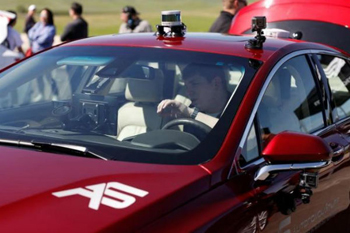Apr 22: Apple Inc outlined a plan to train operators of self-driving cars in documents submitted to California regulators earlier this month, the latest clues to the company's autonomous vehicle technology aspirations.
 Apple was granted a permit to test self-driving cars on April 14 by the California Department of Motor Vehicles but the company has never said anything about its plan.
Apple was granted a permit to test self-driving cars on April 14 by the California Department of Motor Vehicles but the company has never said anything about its plan.
The state released 41 pages of Apple application documents to Reuters that give some clues about the company's highly secret self-driving effort, which it has never openly acknowledged.
The iPhone maker joins a long list of carmakers, start-ups and technology rivals, including Alphabet's Waymo, that are testing cars on state roads. Apple is looking for new hit products and autonomous car technology is expected to revolutionize the traditional auto industry.
As part of the application, Apple included a 10-page training plan that appeared to be related to operators taking back manual control of the car during automated driving exercises of the system, which it calls a development platform.
Apple declined comment beyond the filing.
The plan includes a document called “Automated System: Development Platform Specific Training Overview” whose objective is “to train safety drivers in various automated driving conditions.”
“Development platform will be controlled electronically (e.g. joystick) and safety drivers must be ready to intervene and take control,” the document reads.
The document highlights different scenarios to be tested, from high speed driving and tight U-turns to lane changes.
One letter sent from Apple to the state Department of Motor Vehicles noted that Apple's development platform “will have the ability to capture and store relevant data before a collision occurs.”
The document does not include detail on how Apple's self-driving platform actually works or othertechnical details. It also does not say what kind of sensors are found on Apple's three permitted vehicles, all 2015 Lexus model RX450h.
The permit does not necessarily mean that Apple itself is building a full car. Apple could instead be designing a self-driving platform that can be integrated into other manufacturer's cars.





Comments
Add new comment